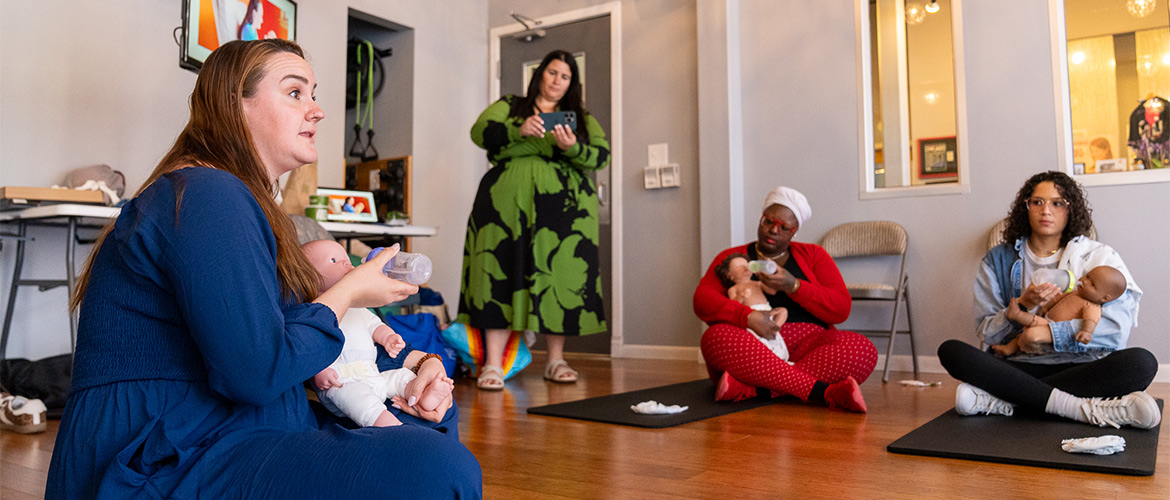After more than two years of trying, Emily Harkins-Widen became pregnant in spring 2024.
Although overjoyed, she and her husband grew anxious after discovering the pregnancy could become complicated. “I felt very alone, isolated and scared,” recalls Harkins-Widen, who gave birth to a healthy daughter, Edith, in December. “I wanted to talk to someone whenever I needed to. I just wanted extra support, someone I could trust along the way during my pregnancy.”
At the recommendation of her obstetrician, Harkins-Widen turned to Chicago Family Doulas, which provided the help and reassurance she craved. Harkins-Widen primarily worked with two doulas — one trained to provide labor and delivery support and a second certified in postpartum care.
“It was just nice to have that resource,” Harkins-Widen says.
As nonclinical professionals, doulas provide physical and emotional support before, during and after childbirth to help families achieve the most satisfying and comfortable experience possible. They help devise birth plans, offer comfort and reassurance during labor and delivery, support breastfeeding and parental baby care at clients’ homes after birth.
Doulas also help parents navigate the health care system. Twenty-seven states, including Illinois, have implemented or are implementing Medicaid coverage for doula care.
Growing the maternal health workforce is one of the focus areas of Blue Cross and Blue Shield of Illinois’ expanded Special Beginnings® initiative launched in 2024 to help increase access pregnancy-related care and improve maternal and infant health outcomes in Illinois.
Chicago Family Doulas was among more than two dozen community organizations and clinical partners selected as grant recipients.
Five of the organizations provide doula training and professional development: Chicago Family Doulas, Chicago Volunteer Doulas, Gifted Hands International, Sokana International and Virtuously B’Earthed.
Annamarie Rodney, owner and founder of Chicago Family Doulas, said the funding will enable the company to train an additional 150 doulas and provide free online childbirth and newborn care classes for families.
“We need to be the support person providing information, kindness, gentleness, information to the space for birth, for postpartum,” Rodney says. “Doulas are the eyes and ears of a situation because we're with families. The professional doula is coming in and looking for those fine details that are often missed because people aren't taking the time to ask the questions.”
Research published by the American Journal of Public Health shows doula care can improve health outcomes. Women with doulas had a 47% lower risk of cesarean delivery and a 29% lower risk of preterm birth, and they were 46% more likely to attend a postpartum checkup.
“In Illinois, women experience distressing rates of pregnancy-related deaths due to cardiovascular disease, mental health conditions, substance use disorders, inadequate access to health care, poverty and housing instability, which create risks for vulnerable mothers and their families,” says BCBSIL Chief Medical Officer Dr. Alvia Siddiqi.
The support from BCBSIL may also strengthen relationships between doula organizations and care providers, Rodney says. “I feel like Blue Cross, being a leader with this organizing and funding doula trainings, will make us and hospitals have important conversations and really change the trajectory of this career.”
Helping families navigate pregnancy and postpartum care
Rodney recently provided a day of hands-on training about labor and postpartum care to 10 doulas gathered around her. Sessions included techniques on labor exercises, swaddling and bottle-feeding.
Participant Yvette Mayo, a postpartum doula and mother of three, says a friend suggested she join the profession because of her love for newborns. Until then, she knew little about doulas and realizes she probably would have benefitted from having one, especially after losing her first baby during pregnancy 17 years ago.
“In that moment, I'm sitting in the doctor's office and you're hit with every emotion,” Mayo recalls. “We knew there was something wrong. That would have been significant just to have somebody walking through that process with me.”
As a postpartum doula, Mayo helps families adjust after returning home after delivery. She spends the first night caring for the newborn while parents sleep. Longer term, Mayo offers guidance on proper feeding and sleep intervals to help prevent malnutrition, while observing signs of postpartum depression in mothers.
“The parents, you're talking to them, you're trying to navigate things with them,” she says. “You're walking with someone like you're in their shoes.”

